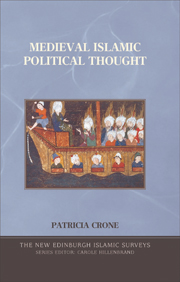Book contents
- Frontmatter
- Contents
- List of charts
- Preface
- Addenda and corrigenda
- I THE BEGINNINGS
- II THE WANING OF THE TRIBAL TRADITION, c. 700–900
- III COPING WITH A FRAGMENTED WORLD
- IV GOVERNMENT AND SOCIETY
- 17 THE NATURE OF GOVERNMENT
- 18 THE FUNCTIONS OF GOVERNMENT
- 19 VISIONS OF FREEDOM
- 20 THE SOCIAL ORDER
- 21 MUSLIMS AND NON-MUSLIMS
- 22 EPILOGUE: RELIGION, GOVERNMENT, AND SOCIETY REVISITED
- Charts
- Bibliography, abbreviations, and conventions
- Index and glossary
19 - VISIONS OF FREEDOM
from IV - GOVERNMENT AND SOCIETY
Published online by Cambridge University Press: 05 August 2013
- Frontmatter
- Contents
- List of charts
- Preface
- Addenda and corrigenda
- I THE BEGINNINGS
- II THE WANING OF THE TRIBAL TRADITION, c. 700–900
- III COPING WITH A FRAGMENTED WORLD
- IV GOVERNMENT AND SOCIETY
- 17 THE NATURE OF GOVERNMENT
- 18 THE FUNCTIONS OF GOVERNMENT
- 19 VISIONS OF FREEDOM
- 20 THE SOCIAL ORDER
- 21 MUSLIMS AND NON-MUSLIMS
- 22 EPILOGUE: RELIGION, GOVERNMENT, AND SOCIETY REVISITED
- Charts
- Bibliography, abbreviations, and conventions
- Index and glossary
Summary
In practice, government was more often than not both weak and oppressive: weak in the sense that it could not get much done, oppressive in the sense that rulers would freely sacrifice the lives and property of their subjects in order to stay in power and keep some semblance of order. It was normal for members of the elite, scholars included, to spend time in jail; most high-ranking governors and generals died violent deaths; and torture, assassination, poisoning, confiscation, and extortion were matters of routine. Yet the desire for freedom remained. Not that medieval Muslims used that term. They did speak of political oppression as enslavement, but they did not call the opposite freedom, for the choice as they saw it was not between slavery and freedom, but rather between slavery to other human beings and slavery to God. No humans had the right to impose obligations on other humans, whether they were rulers, masters, fathers or husbands, or for that matter prophets; only God could do so. To be governed in accordance with God's rules was to be protected from other people's arbitrary desires (hawā). In other words, it was to live as an autonomous person under the law, which is also how political freedom has traditionally been understood in the West. Living in accordance with God's rules was what most Muslims desired. In practice, however, this freedom only obtained in the sphere of life untouched by the state.
- Type
- Chapter
- Information
- Medieval Islamic Political Thought , pp. 315 - 331Publisher: Edinburgh University PressPrint publication year: 2004



